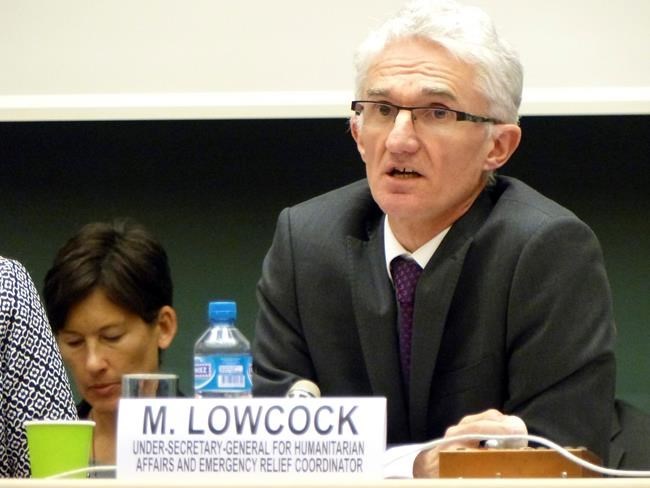
U.N. humanitarian chief Mark Lowcock speaks during a pledging conference of Congo at the European headquarters of the UN in Geneva, Switzerland, Friday, April 13, 2018 where Congo took the extraordinary step of boycotting the international conference that reaped hundreds of millions of dollars to help its people, saying the Central African country's humanitarian crisis has been exaggerated. (AP Photo/Jamey Keaten)
Republished April 13, 2018 - 8:56 AM
Original Publication Date April 13, 2018 - 2:46 AM
GENEVA - Congo on Friday took the extraordinary step of boycotting an international conference that reaped hundreds of millions of dollars to help its people, saying the Central African country's humanitarian crisis has been exaggerated. It later said some aid groups that accept the money would have their activities banned.
The rare and possibly unprecedented snub of the U.N.-led pledging conference by President Joseph Kabila's government — which one U.N. official called "unfortunate" — came amid differing views about the needs of a sprawling country where millions are displaced and hungry during a brewing political crisis.
Congo's government later told The Associated Press that it will ban the work of aid organizations that receive conference funding from countries that have sanctioned Congolese figures. The foreign affairs minister, Leonard She Okitundu, also said his country should have been involved in organizing the gathering.
"We cannot come as a guest," he said.
The event raised $528 million in pledges. U.N. humanitarian chief Mark Lowcock said he was "pleased" and surprised the figure was so high but said he was unable to immediately specify whether it was entirely new funds. Donors this year had already pledged $209 million toward a U.N. appeal for $1.7 billion to help some 10.5 million people in Congo in 2018.
Congo's government has insisted the conference hurts the country's image, and has downplayed the extent of the widespread hunger and displacement. Its ambassador to the U.N. in New York, Ignace Gata Mavita, told the Security Council last month that the U.N.'s crisis level for his country was "excessive" and "exaggerated."
Many speakers from 53 U.N. member states on Friday didn't address the elephant in the room: Congo's absence.
In a brief video message, U.N. Secretary-General Antonio Guterres said the country faces "one of the world's largest humanitarian crises" and that "the single biggest obstacle is the lack of funding."
The charge d'affaires at the U.S. mission in Geneva, Theodore Allegra, said the United States was "disappointed" that Congo's government didn't attend Friday but announced $67 million in new humanitarian assistance for it and neighbouring countries. He cited a "significant deterioration" of humanitarian conditions in Congo in recent years, noting reports of "horrific acts of violence against civilians," extrajudicial killings and the use of child soldiers.
Lowcock said the number of people in Congo in need of assistance doubled last year to 13 million, and cited troubles including inter-ethnic conflict and "an epidemic of sexual violence — much of it against children." The U.N. says 2.2 million children suffer from severe acute malnutrition.
Kabila has been in power since 2001, and the country has simmered with tensions over the long-delayed presidential election, with critics accusing him of trying to cling to power.
Despite the boycott, Lowcock heaped praise on Congo's government, saying it had committed to using more of its own financial resources for humanitarian aid.
"People sometimes forget that lots of things over the last 15 years have improved in Congo," he said.
Kinshasa has been bypassed by such international funding in the past. A similar but smaller funding drive last year collected over $540 million for the country but 85 per cent of that went through independent organizations.
Asked whether Congo's government cared for its own citizens, U.N. humanitarian spokesman Jens Laerke called the boycott "unfortunate" and said: "I think you should ask the government whether it cares for its people."
___
Mwanamilongo reported from Kinshasa, Congo. Associated Press writer Cara Anna in Johannesburg contributed.
News from © The Associated Press, 2018